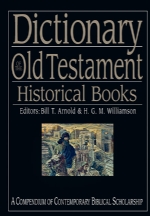$39.99
If you are already a Laridian customer, log in above and we can tell you if you own this product.
This product is also available in the following bundles or collections:
Preview Book
Preview the table of contents and a limited selection of text from this book.
 IVP Dictionary of the Old Testament: Historical Books
IVP Dictionary of the Old Testament: Historical Books

IVP Dictionary of the Old Testament: Historical Books
$39.99
Buy It Once, Use It On These Platforms
Description
Edited by Bill T. Arnold and Hugh G. M. Williamson, the Dictionary of the Old Testament: Historical Books is the second volume in IVP's Old Testament dictionary series. This volume picks up where the Dictionary of the Old Testament: Pentateuch left off — with Joshua and Israel poised to enter the land — and carries us through the postexilic period. Following in the tradition of the four award-winning IVP dictionaries focused on the New Testament, this encyclopedic work is characterized by in-depth articles focused on key topics, many of them written by noted experts.
The history of Israel forms the skeletal structure of the Old Testament. Understanding this history and the biblical books that trace it is essential to comprehending the Bible. The Dictionary of the Old Testament: Historical Books is the only reference book focused exclusively on these biblical books and the history of Israel.
The dictionary presents articles on numerous historical topics as well as major articles focused on the books of Joshua, Judges, Samuel, Kings, Chronicles, Ezra and Nehemiah. Other articles focus on the Deuteronomistic History as well as the Chronicler's History, the narrative art of Israel's historians, innerbiblical exegesis, text and textual criticism, and the emergence of these books as canonical. One feature is a series of eight consecutive articles on the periods of Israel's history from the settlement to postexilic period, which form a condensed history of Israel within the Dictionary.
Syro-Palestinian archaeology is surveyed in one article, while significant archaeological sites receive focused treatment, usually under the names of biblical cities and towns such as Jerusalem and Samaria, Shiloh and Shechem, Dan and Beersheba. Other articles delve into the histories and cultures of the great neighboring empires — Egypt, Assyria, Babylonia and Persia — as well as lesser peoples, such as the Ammonites, Edomites, Moabites, Philistines and Phoenicians. In addition there are articles on architecture, Solomon's temple, agriculture and animal husbandry, roads and highways, trade and travel, and water and water systems.
The languages of Hebrew and Aramaic, as well as linguistics, each receive careful treatment, as well as the role of scribes and their schools, and writing and literacy in ancient Israel and its environs. The Dictionary also canvases the full range of relevant extrabiblical written evidence, with five articles focused on the various non-Israelite written sources as well as articles on Hebrew inscriptions and ancient Near Eastern iconography.
Articles on interpretive methods, on hermeneutics and on preaching the Historical Books will assist students and communicators in understanding how this biblical literature has been studied and interpreted, and its proper use in preaching. In the same vein, theological topics such as God, prayer, faith, forgiveness and righteousness receive separate treatment.
The history of Israel has long been contested territory, but never more so than today. Much like the quest of the historical Jesus, a quest of the historical Israel is underway. At the heart of the quest to understand the history of Israel and the Old Testament's Historical Books is the struggle to come to terms with the conventions of ancient historiography. How did these writers conceive of their task and to whom were they writing? Clearly the Old Testament historians did not go about their task as we would today. The divine word was incarnated in ancient culture.
Rather than being a dictionary of quick answers and easy resolutions readily provided, the Dictionary of the Old Testament: Historical Books seeks to set out the evidence and arguments, allowing a range of informed opinion to enrich the conversation. In this way it is hoped that the Dictionary will not only inform its readers, but draw them into the debate and equip them to examine the evidence for themselves.
Features
- The only major reference book focusing exclusively on Israelite history and the Old Testament Historical Books
- A one-volume library of authoritative and accessible summaries of the latest scholarship from some of the world's preeminent scholars of the Old Testament and the ancient Near East
- Major articles on Joshua, Judges, Samuel, Kings, Chronicles, Ezra-Nehemiah
- Eight major articles covering the periods of Israelite history from settlement to post-exilic periods
- Introductory articles on ancient Near Eastern written sources pertinent to history of Israel
- Articles on Hebrew, Aramaic and Linguistics as well as interpretive methods, hermeneutics and preaching
- Critically engages the current scholarly quest for the historical Israel
- Valuable, up-to-date bibliographies on all topics
About the Editor(s)
Bill T. Arnold is Director of Hebrew Studies and Professor of Old Testament and Semitic Languages at Asbury Theological Seminary. He is the author of several books, including 1 and 2 Samuel, Encountering the Book of Genesis and (with John H. Choi) A Guide to Biblical Hebrew Syntax. He coedited The Face of Old Testament Studies.
H. G. M. Williamson is Regius Professor of Hebrew at Oxford University, on the faculty of The Oriental Institute and a Fellow of the British Academy. He is the author of several books and numerous articles on the Old Testament, including commentaries on 1 and 2 Chronicles, Ezra and Nehemiah, as well as The Book Called Isaiah and Studies in Persian Period History and Historiography.
System Requirements
Installed size (unless otherwise indicated): Approximately 8.625 MB. iPhone, iPad, and iPod touch Requires iPhone, iPod touch, or iPad running latest version of iOS. Download size: 8.625 MB. Android Requires Android OS 4.4 or later. Download size: 8.625 MB. Windows Phone Requires Windows Phone 7.5 or later. Download size: 8.625 MB. Windows Store Requires Windows 8, 10, 11 or later. Download size: 8.625 MB. Windows Desktop Requires Windows 2000, XP, Vista, Windows 7, 8, 10, 11 or later. Download size: 4.875 MB. Mac OS Requires macOS 10.13 or later. Download size: 8.625 MB.
The Fine Print
Copyright © 2010-2025 by Laridian, Inc. All Rights Reserved.
Laridian and PocketBible are registered trademarks of Laridian, Inc. DailyReader, MyBible, Memorize!, PrayerPartner, eTract, BookBuilder, VerseLinker, iPocketBible, DocAnalyzer, Change the way you look at the Bible, and The Bible. Anywhere. are trademarks of Laridian, Inc. Other marks are the property of their respective owners.
About You
- You are viewing the mobile version of our website.
- You are not logged in.
- Your IP Address: 3.145.51.214
- Site IP Address: 69.167.186.191
Social Media
Like and follow us on Facebook.
Follow us on MeWe.
Stay Informed
We announce new products via email. If you ask to be removed from any of our mailings, you will not receive these notifications. If your email address changes, make sure you change it here, too.
From time to time we post things on our blog, on MeWe, and on Facebook.
The Fine Print
Copyright © 2010-2025 by Laridian, Inc. All Rights Reserved.
Laridian, PocketBible, and MyBible are registered trademarks of Laridian, Inc. DailyReader, Memorize!, PrayerPartner, eTract, BookBuilder, VerseLinker, iPocketBible, DocAnalyzer, Change the way you look at the Bible, and The Bible. Anywhere. are trademarks of Laridian, Inc. Other marks are the property of their respective owners.
Products by Platform
Bible Reader Software
- PocketBible for iPhone/iPad
- PocketBible for macOS
- PocketBible for Android
- PocketBible for Windows Store
- PocketBible for Windows Phone
- PocketBible for Windows
BookBuilder Software
- BookBuilder for Windows
- BookBuilder Pro for Windows
- BookBuilder for macOS
- BookBuilder Pro for macOS
- Self-Publishing Info
About Laridian
Products by Type
Your Account
- You are not logged in.
- Your IP Address: 3.145.51.214
- Site IP Address: 69.167.186.191
- Your Account Information
- Your Order History
- Your Downloads
- Your Notes, Highlights, and Bookmarks
- Your BookBuilder Books
- Your Shopping Cart
- Register Purchase from a Store
Best Ways to Get Help
You can get the fastest help by helping yourself.
- Make sure you download and install the PocketBible app that is required to read the Bibles or books you bought
- Read the confirmation email we send you when you make a purchase
- Read the help that's built into each of our products
- Look through our Frequently Asked Questions
- Submit a Support Ticket
- Email us at support@laridian.com








